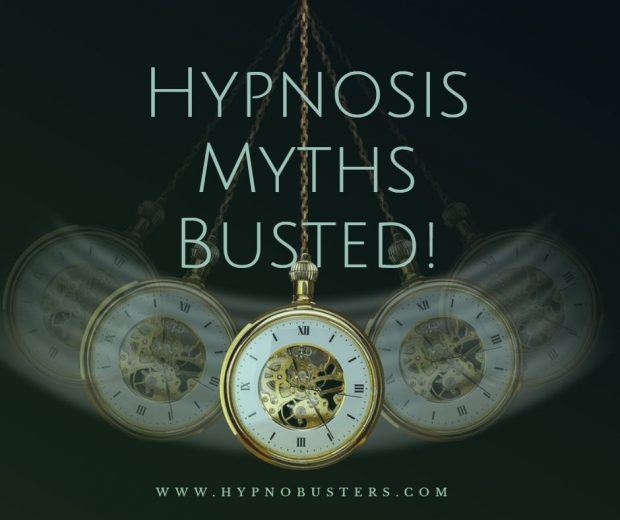 There are few subjects that have more myths and misconceptions than hypnosis. This is largely down to films, television, and newspapers dramatising hypnosis and not representing hypnosis in its true light. They naturally like this sensationalism as it attracts more attention to their content.
There are few subjects that have more myths and misconceptions than hypnosis. This is largely down to films, television, and newspapers dramatising hypnosis and not representing hypnosis in its true light. They naturally like this sensationalism as it attracts more attention to their content.
The truth about hypnotherapy is nowhere near as exciting, mysterious and magical as many are led to believe. Hypnosis IS a powerful tool for change when in the right hands, but there is no actual ‘magic’ involved. Sorry to be such a bore!
In order to dispel some of the misconceptions surrounding hypnosis, here is a run down of the top ten popular hypnosis myths…
A hypnotist might turn you into a chicken.

A properly trained clinical hypnotherapist would never do this. This is confusing a stage hypnotist with a therapeutic or clinical hypnotherapist.
A stage hypnotist will do this because that is what is expected of them. You agree to this by stepping on stage and joining the show.
However you will easily return to your normal state at the end. In a clinical setting you only agree to the therapeutic goals for the session, so that is all that will occur.
The majority of clinical hypnotherapists (me included) would not know how to do these tricks even if they wanted to. Stage and clinical hypnosis are two very different disciplines.
You must be weak minded if you can be hypnotised.

This is the wrong way of looking at it. A hypnotherapist simply guides or helps a person into trance. He does not ‘make’ them go into a trance.
A hypnotic trance is a normal and natural mental state that most of us slip into several times a day. It occurs when you are daydreaming, or so totally absorbed in a book or film that you forget what is happening around you.
This is the state of mind you want to get into, and the hypnotherapist is there to help you.
It is actually a skill to go into a deeply relaxed trance when you want to. The hypnotherapist helps you, but ultimately it is how you use your mind that determines how deep into a trance you go.
People often find that the more experience they have of going into a trance, the easier and deeper they go. So ‘being hypnotised’ is actually a skill on the part of the subject, that can be improved over time.
You are asleep when in a hypnotic trance.

Many years ago hypnotherapists did use suggestions of ‘sleep’ when guiding someone into a hypnotic trance. This is rarely done now as most hypnotherapists agree that this can confuse the subject as to what state of mind they are aiming to achieve.
Most hypnotherapists now use suggestions of deep relaxation rather than sleep. However the media still continues to portray an outdated image of a hypnotist.
Hypnotists swing a watch in order to hypnotise a subject.
Hypnotherapists rarely do this, although it is one technique that can be used out of thousands of others. I personally do not do this as I wish to distance myself from the stereotype of a stern and sinister hypnotist, with a thin black moustache, and a manic stare. However I am happy to swing a watch if a subject specifically asks for this.
People sometimes become stuck in hypnosis.
This is not true, despite what the tabloid press occasionally claim. On rare occasions a subject may not come out of the trance straight away. This is usually because they are enjoying the relaxing state so much that they don’t want to come out. A few gentle prompts, such as threatening to charge double for a longer session, is always sufficient to wake them!
You will become stuck in hypnosis if something happens to the hypnotist.
Again this is not true. A person will eventually become bored and will just get up when they feel like it. The hypnotist holds no special power over the subject whatsoever. In fact a person can hypnotise themselves. This is called self hypnosis, and they can wake themselves whenever they choose.
Hypnosis is dangerous in the event of a fire or another disaster.

A person in a hypnotic trance is just as aware, if not more so, of potential danger. If a fire broke out during a session, a person would easily come out of the trance and deal with the situation immediately, and in an appropriate way.
If you drive a car, then you might be able to understand what I am about to say. When driving we often slip into a trance, especially when we are driving routes that we often take, such as to and from work. We can slip into a trance and daydream, and barely remember the journey at all. Sometimes we may even wonder how we managed to get to our destination at all! Sound familiar?
In the event of danger, you instantly snap out of this state and deal with the situation. In fact you will probably deal with it quicker and more effectively, as your mind doesn’t have chance to ‘over think’ with your conscious mind and slow down the response
You are not hypnotised if you can hear the hypnotist.
This is also not true. Each person has a unique experience of hypnosis. Some people consciously hear the hypnotist, whereas others do not. This has no bearing on the success of the session whatsoever.
It is usually down to choice. You can choose to allow your mind to drift away, or you can choose to listen carefully to what the hypnotherapist is saying. Some people simply cannot resist allowing their minds to drift away, as they gain so much relaxation pleasure from it. This is totally fine.
You can be made to reveal your deepest secrets when in a hypnotic trance.
Since your mind is fully aware and awake during a hypnotic session, this is not possible. If you do not want to talk about something then you are under no compulsion to do so.
A person can easily lie and are more likely to be creative with the truth when in a hypnotic trance. This is why courts will not accept the testimony of witnesses who are in hypnosis.
Hypnotherapists have special powers.

It’s funny how even intelligent people believe this. A hypnotist is a normal person who eats, sleeps, feels happy and sad, and loses their car keys. There is nothing special or magical about them at all.
We have been trained, and have honed this training with experience, to help guide people into a hypnotic state, then deliver cleverly worded suggestions to your subconscious.
A stage hypnotist may play on having ‘hypnotic powers’ in order to add excitement and drama to their shows, but they too will readily admit that they are using techniques that have been learnt with practice and experience.
Final Thoughts
So there you go, hypnosis and hypnotherapy is not magical or mysterious when you know the truth. Don’t believe the hypnosis myths! It is simply a group of techniques for focusing the mind so that your subconscious can absorb pre agreed suggestions. The reality has been bent and distorted by sensationalism. This is a pity because this probably prevents many people, who would greatly benefit from hypnotherapy, from daring to try it for the first time.
I urge you to make a commitment and try hypnosis even once. It is perfectly safe so you have nothing to lose. If hypnotherapy is for you, then you will have unlocked a whole world of possibilities for personal growth, change and improvement. Many people’s lives have been turned around with hypnosis. Don’t let this potential opportunity slip you by…
Please CLICK HERE To Check Out My Big Collection Of Therapeutic Hypnotherapy MP3s
